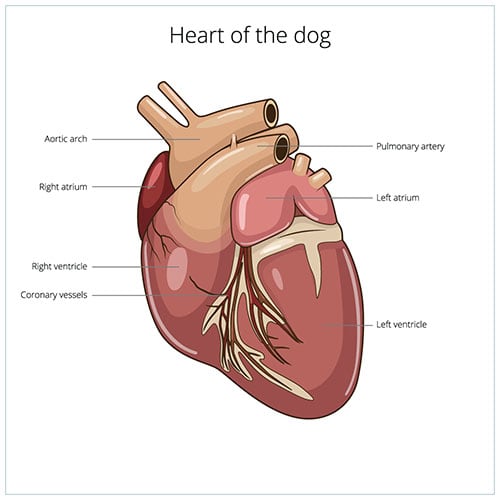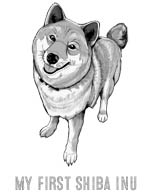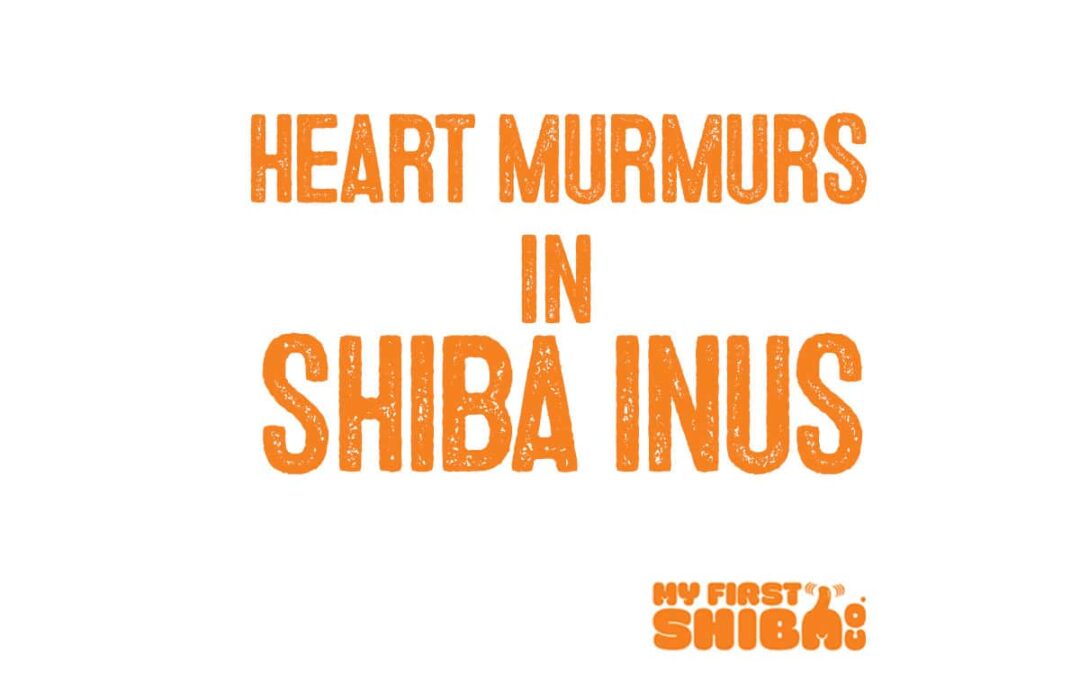On occasion, our posts contain affiliate links. However, we only recommend products that we truly believe in. For more information, visit my privacy policy page.

Lub-dub. Lub-dub. Lub-dub.
This is the way a normal heartbeat in a dog is described.
When your dog has a heart murmur, it means the heart sounds aren’t normal when the veterinarian listens with a stethoscope.
Lub-whoosh, lub-whoosh, lub-whoosh.
Or maybe lub-swish-dub, lub-swish-dub, lub-swish-dub. Something more like that.
What’s this mean for your canine companion, and are Shiba Inus more prone to heart murmurs than other breeds?

What Are Exactly are Heart Murmurs?
To understand heart murmurs, you need to understand normal blood flow through the heart.
A normal dog heart has four chambers which are separated by valves. After circulating through the dog’s body, unoxygenated blood returns to the heart through large veins called the vena cava.
The first heart chamber the blood enters is the right atrium. The blood flows from the right atrium through the tricuspid valve into the right ventricle.
From the right ventricle, blood will be pumped through the pulmonary valve into the lungs. Here, the blood will become reoxygenated.
After leaving the lungs, blood enters the left atrium. It passes through the mitral valve into the left ventricle.

From here, blood will be pumped through the aortic valve to the rest of the body.
It’s hard work pumping blood to the whole body, so the left ventricle is typically the most muscular chamber of the heart. The aorta is a very large artery that carries blood away from the heart to the rest of the body.
The normal heart sounds are caused by the flow of blood moving through the chambers as the heart valves open and close.
The first sound – the lub – results from the mitral and tricuspid valves closing. The second heart sound – the dub – is produced by the aortic and pulmonic valves closing.
A heart murmur is an abnormal heart sound that occurs due to turbulent blood flow within the heart.
For example, if there is a hole in the wall between two heart chambers, blood passing through the abnormal hole might make an abnormal heart sound.
Similarly, if a valve isn’t shaped normally, blood won’t flow through it normally. The resulting turbulence may make an abnormal sound.

Heart Murmur Grades Explained
There are six grades of heart murmurs, ranging from grade 1 to grade 6.
The grade of a heart murmur is based on how loud it is. A grade 1 heart murmur is barely audible.
A grade 6 is loud enough that the veterinarian can hear the murmur without even touching their stethoscope to the chest wall.
Importantly, the grade doesn’t always correlate with the severity.
A dog with a loud grade 5 or 6 heart murmur doesn’t always have severe underlying disease. Conversely, a dog with severe heart disease can have a quiet murmur.
Are Shiba Inus Prone to Heart Murmurs?
A dog of any breed can have a heart murmur, including Shiba Inus. However, Shibas don’t appear to be more likely than other dogs to develop congenital heart defects.
Congenital heart disease is malformation of the heart or its vessels, with the abnormalities present at birth.
According to the Orthopedic Foundation for Animals (OFA), at the time of the writing of this article, of the 805 Shiba Inu hearts they have screened for congenital heart disease, 100% of them have been normal.
This isn’t to say it never happens! One study did include Shiba Inus under a list of purebred dogs they’d detected congenital heart disease in, but the Shibas weren’t listed as being in the top 21 breeds.

Of the 291 Shiba Inus the OFA has scanned for heart conditions using a basic screening (licensed veterinarian listening to the heart), 100% have also been normal.
The OFA records results for advanced cardiac screening, which requires an echocardiogram (ultrasound of the heart), but it doesn’t appear they have any data publicly available for Shibas at this time.
Currently, the OFA doesn’t require a cardiac screening for breeding Shibas to get CHIC certified, which means they don’t consider heart disease a common genetic condition in the breed.
What Are Innocent Heart Murmurs?
An innocent murmur in a puppy is a heart murmur that isn’t caused by an underlying heart abnormality.
While not all grade 1 or 2 heart murmurs are innocent, most innocent heart murmurs are quiet, so they’re usually graded a 1 or 2.
Innocent murmurs are found in over one-fourth of puppies. Most innocent heart murmurs will go away by the time the puppy is 6 months old, according to the Cornell Richard P. Riney Canine Health Center. These murmurs have no impact on the dog’s health.
If your veterinarian detects a quiet heart murmur in a puppy, they may recommend re-evaluation as the puppy matures.
If the heart murmur is decreasing in intensity or goes away over time, it was likely an innocent murmur. In this case, there is no cause for concern.
However, if the murmur is persistent or gets louder, it may indicate a congenital condition that could impact your pet’s health.
The veterinarian will recommend additional testing, specifically an echocardiogram, to determine if there is an abnormality in the heart.
Not all abnormalities will be serious, but the echocardiogram will help determine if additional steps are necessary.

What Heart Defects or Conditions Cause Heart Murmurs?
A variety of heart defects cause heart murmurs in dogs. More common causes of heart murmurs in dogs include:
- Patent ductus arteriosus (PDA): When a puppy is still a fetus, their blood doesn’t need to go to the lungs to get oxygen. Instead, the blood skips the lungs by going through a connection between the aorta and the pulmonary artery called the ductus arteriosus. This connection should close when the puppy is born. If the connection remains open, it creates a constant heart murmur described as sounding like a washing machine.
- Septal defects: Holes between heart chambers are called septal defects. In most cases, the septal defect is between the two ventricles.
- Pulmonic stenosis: The pulmonary valve is narrowed. This most often happens because the leaflets of the valve are thickened or partially fused together.
- Subaortic stenosis: With this condition, the area beneath the aortic valve is narrowed, obstructing the flow of blood through the heart.
- Dilated cardiomyopathy (DCM): With DCM, the walls of the ventricles narrow, and the heart chambers dilate. Genetics play a role, though nutrition is also being investigated as a contributing factor.
- Valvular degeneration: Most commonly, the mitral valve is affected. Over time, the valves degenerate, causing progressive thickening of the valve leaflets.
- Valvular dysplasia: Dysplasia is congenital malformation of the valves.
Heart murmurs sometimes have causes that aren’t related to the heart itself, which is called a “functional heart murmur.” Extracardiac conditions that could cause a heart murmur include anemia, fever, or pregnancy.
Can Heart Murmurs in Shiba Inus Be Prevented?
If an adult dog has a heart disease, we generally recommend against breeding that dog.
This is because some heart conditions are suspected to have a genetic component.
However, some heart conditions occur without a family history, so there is no guarantee that your dog won’t have a heart murmur at some point in life.
What Are the Symptoms of a Heart Murmur?
Heart murmurs don’t generally have symptoms, but the underlying heart condition might. Symptoms of a heart condition could include:
- Irregular heartbeat
- Racing pulse
- Vibrations that can be felt with your hand on the bottom of the chest (palpable thrill)
- Poor growth in a puppy
- Poor appetite
- Persistent coughing
- Excessive panting, even at rest
- Tiring quickly, lack of energy, exercise intolerance
- Collapse or fainting
- Bluish color or paleness of the gums and/or tongue
- Abdomen bloated with fluid or edema (fluid swelling) in the limbs

Treatment For Heart Murmurs
Innocent heart murmurs don’t require treatment.
Functional heart murmurs with extracardiac causes usually go away once the inciting cause has improved.
Some heart murmurs that are caused by abnormalities in the heart don’t require treatment. In these cases, monitoring of the heart murmur will be recommended.
Monitoring may include a full physical examination, chest x-rays, an echocardiogram, and blood work (especially cardiac troponin 1, which is a measure of damage to the heart).
However, some causes of heart murmurs will require treatment.
Congenital heart diseases may require surgical treatment whereas heart murmurs that develop later in life are typically medically managed.
Surgical management of PDAs involves either open chest surgery to close the open duct or through a minimally invasive surgery to occlude the connection through a catheter advanced to the heart.
For some stenotic valves, ballooning of the valve may be an option. Any heart surgeries are generally performed by a specialist – either a surgeon or, in some cases, a cardiologist.
Medical management may include a cardiac-friendly (low sodium) diet, exercise restriction, weight management, and medications like pimobendan.
Treatment recommendations will vary based on the types of underlying heart condition, as well as severity.
What Is the Prognosis for Heart Murmurs?
Some heart murmurs have a great prognosis!
Innocent murmurs have no effect on a dog’s health and go away on their own.
Even some murmurs that are due to cardiac abnormalities only require monitoring. For example, a very small septal defect may not require intervention.
In some cases, the prognosis depends on how early you intervene.
For example, PDAs usually have a great prognosis if surgical repair happens early, with dogs going on to a normal life expectancy.
However, if you wait too long, you will be unable to pursue surgery. Dogs with untreated PDA usually develop congestive heart failure, usually surviving under a year once heart failure develops.
F.A.Q's.
Can heart murmurs cause heart attacks?
Heart attacks are very rare in dogs.
A heart attack occurs when blood flow to the heart is reduced or blocked.
You’re more likely to see a heart attack if the dog has a condition that makes their blood clot more easily.
However, the underlying conditions that cause heart murmurs can cause damage to the heart and lead to heart failure.
Do dogs need to avoid activity with heart murmurs?
Not all dogs with heart murmurs need to have their activity restricted.
We would recommend restricting your pet’s exercise until you have clearance by your veterinarian.
If your veterinarian diagnoses a heart murmur, make sure to ask them about exercise restriction.
Should I avoid getting a Shiba Inu puppy that had an “innocent” heart murmur?
An innocent heart murmur isn’t a reason to avoid adopting a puppy.
However, if your newly adopted puppy has a heart murmur, you may need to follow up with the veterinarian to determine if the murmur is innocent.

Thanks for visiting Myfirstshiba.com! We do our very best in providing our readers with awesome content about our beloved Shiba Inu breed. Some of our articles include reviews and recommendations to our favorite products. We do occasionally earn commissions from certain affiliate links that help support our work and mission. Thanks again for visiting. Shiba Kisses To All!

